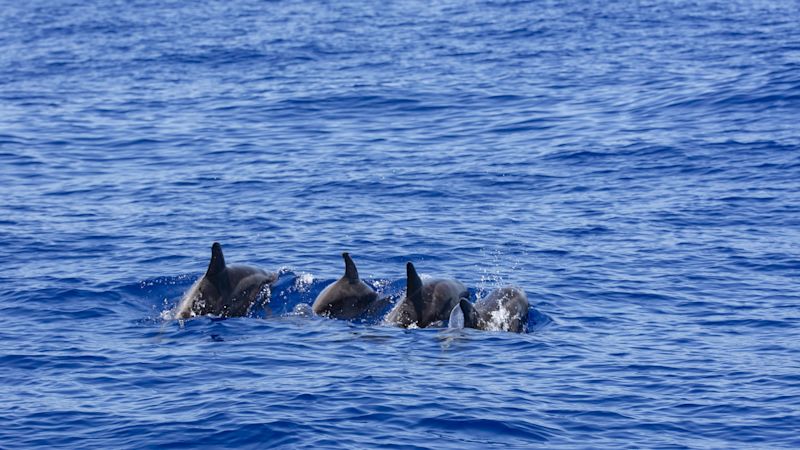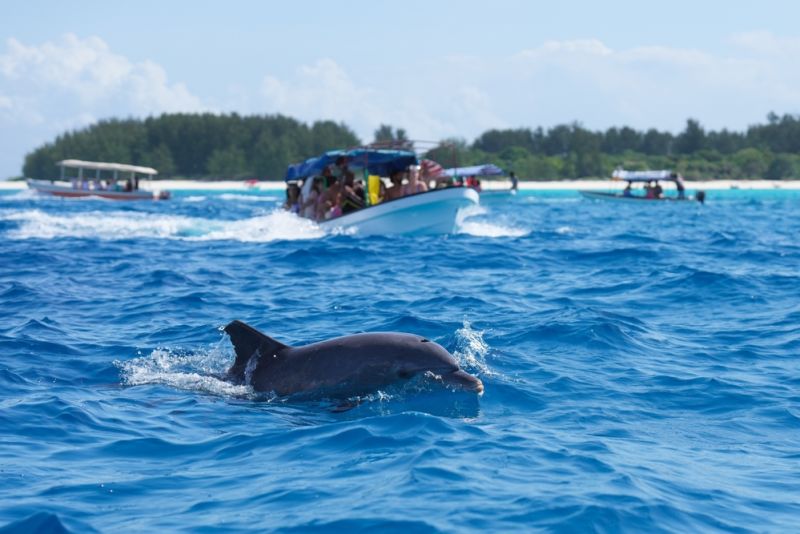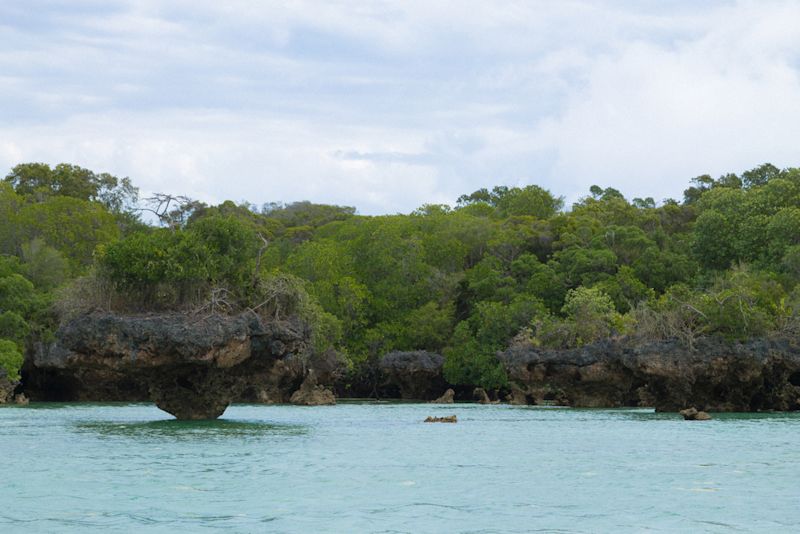Are there ethical dolphin tours in Zanzibar? Or should you skip the idea altogether? We briefly look at the reasons for and against dolphin tours in general. This includes considering the impact of such tours on dolphin populations. We then offer our advice on how to find a reputable dolphin tour operator in Zanzibar. And we discuss best practices for swimming with dolphins.
Is there such a thing as an ethical dolphin tour?
This is an important question, but it's hard to answer. As with so much in life, no response worth anything can be reduced to a tweet or a meme. It requires the time and space of a more nuanced discussion. Moreover, at the end of the day, the answer does, in many ways, boil down to your personal stance on the value of wildlife and the importance of animal welfare.
A big reason why some say that ethical dolphin tours don't exist is that overexposure can lead to pods becoming habituated to the presence of humans. This in turn prompts the pods to swim too closely to boats and humans, which can lead to them being accidentally bumped by boats, getting caught in nets, or contracting diseases (they're mammals too, remember).
Other reasons for arguing against dolphin tours include that they lead to habitat degradation and they disrupt or alter dolphins' habits. These in turn lead to dwindling population figures.
Suffice it to say that we understand and respect why many folks advocate staunchly against dolphin tours, full stop. We agree that in an ideal world everyone leaves dolphins alone to live their lives undisturbed. Certain places (like Hawaii) have, in fact, banned dolphin swimming altogether.
Yet it's unlikely that the industry will be banned everywhere in the world (at least not in the near future). Too many people are fascinated by these aquatic mammals, which means there's money to be made and so dolphin tours are going to keep taking place.
As far as we can tell, dolphin tours in Zanzibar are not going anywhere. So should we instead be pragmatic and focus on talking about dolphin tour best practices?
The impact of dolphin watching on Zanzibar's dolphins
Zanzibar's dolphin populations are becoming shyer
Zanzibar's dolphin tours take place in the shallow and sheltered waters of Menai Bay. This bay is located off the southwest coast of Unguja, the main island of the Zanzibar archipelago.
There are two types of dolphins living in Menai Bay:
- Endangered Indian Ocean humpback dolphins (Sousa plumbea)
- Indo-Pacific bottlenose dolphins (Tursiops aduncus)
Dolphin tours in Zanzibar are being conducted with varying degrees of caution (or with no caution at all), and as such the industry is negatively impacting dolphin population figures and behaviours.
The Marine Mammal Protected Areas Task Force believes dolphin watching activities have negatively impacted the number of Indian Ocean humpback whales living within the Menai Bay Conservation Area (MBCA). There's also plentiful evidence that tourists can distract and overstimulate bottlenose dolphins (a species known for its curiosity towards humans), which can keep them from important tasks like foraging and resting. This in turn leads to a decrease in population figures.
With this in mind, perhaps consider cancelling the dolphin tour idea – you can at least remove yourself from the equation if you're concerned about their wellbeing? There are other wonderful wildlife experiences to enjoy in Zanzibar, such as looking for rare red colobus monkeys in Jozani Forest.
That said, if you're dead keen to go on a dolphin tour during your Zanzibar holiday, please read on for our advice on how to do so in the most ethical way possible.
Guidelines for dolphin watching
Boats should never try to draw too close to the dolphins
Watching dolphins from a boat is usually preferable to trying to swim with them.
One reason for this is that it's easier for the animals to keep track of a large, single object on the water's surface (the boat) than it is for them to monitor multiple smaller forms bobbing and dipping in the water (humans). In other words, a boat is usually less disruptive and stressful for the dolphins.
Here are some important guidelines for dolphin watching from a boat:
1. Never chase a dolphin pod
This is highly stressful for them. Of course, this is outside of your control, as it depends on your boat driver. With this in mind, we chat in a moment about how to choose an ethical boat driver – or, more to the point, how to choose an ethical tour operator, since they hire and train their drivers.
2. Don't try to catch the dolphins' attention
Please don't ever shout or make other loud noises to try to catch the attention of the dolphins. You want to interfere with the dolphins' natural behaviours and patterns as little as possible.
3. Never try to feed a dolphin
The dolphins you visit on a Zanzibar dolphin tour are part of wild pods, and it's important not to mess with their feeding habits. If dolphins were to learn that boats bring easy food, this could change their behaviours in truly problematic ways.
Guidelines for swimming with dolphins
The joy of dolphin swimming is watching them from under the water
Dolphin swimming is an extension of dolphin watching, since you also go out on a boat. But when you find a pod, your skipper kills the engine and you slide off the side of the boat and into the water.
It's naturally very thrilling to be in the water in the presence or vicinity of dolphins. You can listen to their whistles and clicks, which are sometimes audible even when you can't see the dolphins themselves.
That said, if you're lucky enough to also see the dolphins swimming under the waves, well, that's a super privileged moment for you. (Be sure to bring or hire some quality underwater goggles to allow you to properly appreciate their beauty and behaviours when submerged.)
While swimming with dolphins is undoubtedly a very special experience, please be mindful of how you go about it. Here are three important guidelines for ethical dolphin swimming ...
1. Don't try to approach the dolphins
The best way to swim with dolphins is to swim near to them, not with them. Please don't ever try to swim up to a dolphin.
2. Never touch a dolphin
Please don't ever touch a dolphin, even if it swims right up to you, making it easy to do so.
Some of the dolphins in Zanzibar's Menai Bay are quite accustomed to the presence of humans. Bottlenose dolphins are, in addition, relatively bold. So it's possible that a bottlenose could approach you while you're in the water. Even though it would be very tempting, please don't touch them, not under any pretext.
Human touch can have a few negative consequences for dolphins:
- Even a gentle touch can disrupt their protective mucous layer, leaving them vulnerable to infections and sunburn.
- It can be stressful for them and hence disruptive of their natural behaviours.
- You could unknowingly transmit a disease to the dolphins, who are also mammals.
Remember that just because a practice is commonplace (like how humans swim with and touch dolphins in marine parks all over the world), it doesn't mean it's a good idea. Permissible is not the same as ethical.
3. Wear reef-friendly sunscreen
Wearing reef-friendly sunscreen is an important aspect in dolphin swimming as well as in marine conservation in general.
Regular sunscreens contain chemicals like oxybenzone and octinoxate, which can be toxic to dolphins, either through absorption or ingestion. These chemicals can also damage coral reefs, which house critters that dolphins eat. So please be sure to only use a reef-safe sunscreen.
Sustainable dolphin tourism in Zanzibar
Menai Bay is an exceptionally pretty bit of coastline
Kizimkazi is a small fishing village within Menai Bay whose economy has become wholly entwined with dolphin tourism.
Almost certainly the most positive aspect of dolphin tours has been the influx of capital leading to the creation of jobs for those living in this remote community. But for Kizimkazi's dolphin tourism industry to stand any chance of being truly sustainable, it's imperative that visitors support the most ethical tour operators on the scene.
One of the core things distinguishing dolphin tour operators is how they train their boat drivers. Many dolphin tour skippers, for instance, will chase down a dolphin pod when they find it, concerned above all else with pleasing their guests. Such chases are naturally alarming to the dolphins. Today, Menai Bay sees fewer dolphins coming to the surface as a consequence of such behaviours. The dolphins are also shyer around boats and humans in general.
Ethical boat drivers give dolphin pods a respectful berth so as not to harass them. This means guests who go out onto the ocean with an ethical skipper might not get as close as to the dolphins as others. But you can be glad that you're not adding to the creatures' distress.
We also encourage you to hold your skipper accountable during your dolphin tour; if you feel they're pushing the boundaries in any way, call them out. While it shouldn't be up to customers to enforce best practices, it might be necessary on occasion.
If you're travelling to Zanzibar with a tour operator (like Follow Alice), you could ask them to recommend a reputable dolphin tour company to you. If you intend to book your own dolphin tour, we encourage you to research the company's take on sustainable dolphin tourism. Any dolphin tour operator worth anything engages properly with this subject online. You might also like to read customer reviews to see if the company lives up to its ethics claims.
Finally, if you've read to the end of this post, we think it's safe to assume that you're a conscious consumer who cares about the impact of your travels! With this in mind, you might enjoy reading our top 13 tips on How to travel responsibly and sustainably.







